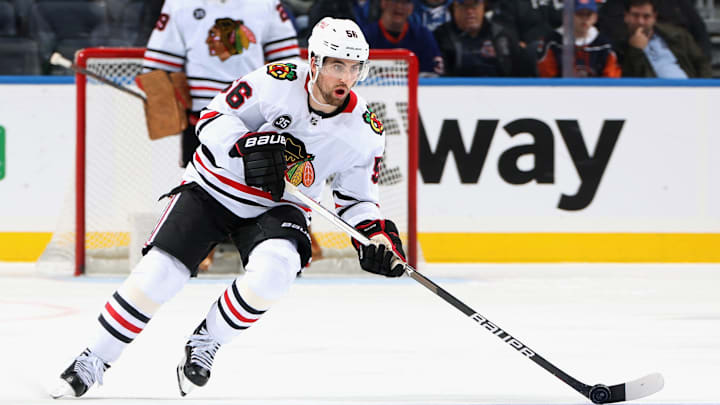Four years ago, Erik Gustafsson scored 60 points for the Chicago Blackhawks. His offensive output overshadowed his lapses on defense. The following year he was traded to Calgary, then Philadelphia and finally Montreal. He still had the same defensive deficiencies, but now, his offensive prowess waned as well. He struggled to score. So, what did the Hawks do? Stan Bowman brought him back in to add depth to a very thin defensive corps.
Blackhawks' fans have seen this too many times over the past few years. Making unpopular trades with Arizona and bringing players back who are past their prime is the forte of Bowman. Add Erik Gustafsson to names like Marcus Kruger and Johnny Oduya in this regard. Couple that with allowing the likes of Michal Kempny, Henri Jokiharu, Adam Boqvist, Olli Maata and Gustav Forsling go while bringing back Gus simply leaves a bad taste in fans' mouths.
So, is Erik Gustafsson as bad as most make him out to be or is he simply the target for fans upset about continuous bad decisions? First, a quick comparison of Gustafsson against his own teammates shows something rather startling. In nearly every statistical comparison, Gustafsson ranks no lower than second on the team. Some of the stats are more offensive in nature, but must be looked at in totality. Further, these are five on five stats so power play points will not inflate his stats.
Let's start with Corsi and Fenwick. These stats indicate offensive pressure. I think it's important because strong defensive units are good at getting the puck out of their own zone pushing the puck up ice. This typically leads to O-zone pressure. In Corsi, Gus ranks second with a Corsi% of 51.19. He is the only one on the team who has played more than three games with a Corsi over 50%. For Fenwick, Gus ranks first with a Fenwick % of 51.22. Again, he is the only one with a Fenwick over 50% who has any significant ice time.
It's one thing to put pressure on the opposing team, it's another to put the puck in the net. If we look at the Goals For (GF)%, Gus ranks second on the team again with a GF% of 55.10% meaning that Gus was on the ice for over half of the team's goals. Again, the only one higher that Gustafsson was Jakub Galvis who has only played three games. The same story stands for Shots For% (SF). Gus ranks second again with an SF% of 51.22, only behind Galvis. If we go one step further, Gus ranks second again for Scoring Chances while he is on the ice and second for High Danger Goals.
If we look at the more defensive stats like blocks and hits, Gustafsson ranks much lower. He has 36 blocks and 30 hits on the season. He ranks below Conor Murphy, Seth Jones, Calvin DeHaan and Jake McCabe. Murphy leads the team with 116 blocks and 96 hits. For anyone who has watched, it's obvious that Gustafsson is not as physical as the other defensemen. The hits are indicative of a deficit in Gus's defense; he is not physical and struggles to play the man effectively. However, I would hesitate to rate defensemen solely on blocks. Murphy, DeHaan and McCabe should have more blocks because of their roles on the penalty kill. Plus, they spend more time in the defensive zone, so will likely face more shots. Bad teams will usually have more blocked shots.
What do we make of this? Erik Gustafsson isn't as bad as he is labeled. On a team struggling to score, he is a nice addition. Is he a shutdown defender? No, and he never will be. Is he expendable? Probably. I was one who previously thought he should be dealt immediately, but he is clearly not the albatross we all thought he was. The "eye" test says he isn't very good, but his stats say otherwise. This places him somewhere in the middle of the Hawks lineup.
The real problem here is that we all know he is not a solid defender, yet he is statistically one of the better D-men on the Blackhawks. I think his ability, or lack of, is more of an indictment of the state of the Chicago Blackhawks' defense. Rather than focusing on Gustafsson, Chicago needs to hold all of the other defensemen accountable. Likely, this will mean moving deHaan immediately. The salaries of Murphy and McCabe could pose a problem, but the Hawks will likely try to move them. Jones is a Hawks long term. And Gus? if the Hawks can sign him for less than $800,000, they probably should. His return will be minimal.
